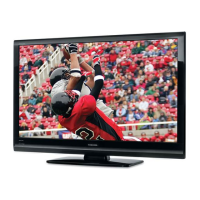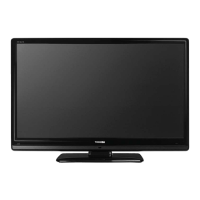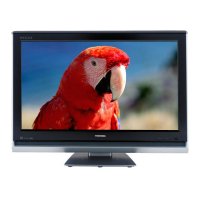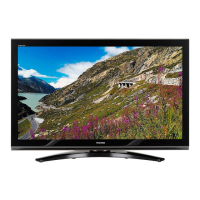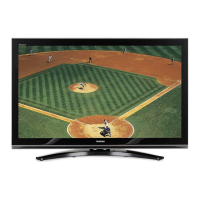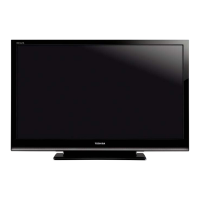Do you have a question about the Toshiba Regza 42XV635D and is the answer not in the manual?
Discusses safety precautions for installing and using the TV, including ventilation, heat, and mains supply.
Provides guidelines for TV installation, placement, cleaning, and important notes on picture quality and warranty.
Explains the functions and layout of the TV remote control with a detailed reference.
Details how to insert batteries correctly and the operational range of the remote control.
Guides on connecting various external devices like decoders, media recorders, and audio systems.
Instructions for connecting HDMI or DVI devices to the TV's HDMI port for digital audio and video.
Explains how to connect and control REGZA-LINK compatible AV amplifiers or playback devices.
Details connecting a PC to the TV via RGB/PC or HDMI terminals for display and sound.
Describes the TV's physical buttons, power switch, and various input/output connections.
Guides through the initial setup process upon first power-on, including language and location settings.
Configuration options for antenna and cable input signals for channel tuning.
Process for automatically scanning and tuning TV channels for available DTV and ATV services.
Manual tuning procedure for analogue TV channels, including system and fine-tuning adjustments.
How to skip unwanted channels during channel tuning to avoid viewing them.
Method for reordering and saving preferred channel positions in the channel list.
Steps for manually tuning digital TV channels, including signal strength and multiplex scanning.
Customizing channel order and preferences for digital TV, including moving and renumbering channels.
Choosing between Home and Store display modes for optimal TV performance.
Enables automatic updating of channels in standby mode for new digital services.
Manually setting character sets for DVB-C or DVB-T channels.
Information regarding the phasing out of analogue TV services and the need for re-tuning.
Overview of basic TV controls like position selection, time display, and stereo/bilingual transmission settings.
Accessing frequently used TV options like Picture Mode and Sleep Timer via the Quick Menu.
Adjusting volume, mute, dual language, and advanced sound settings for enhanced audio.
Adjusting basic sound equalization settings in digital and analogue modes.
Enhancing the audio experience with surround sound, voice enhancement, and dynamic bass boost.
Balances volume differences between various input sources for consistent sound.
Configuring sound output options for connected headphones, including speaker link.
Provides a narrative audio track for visually impaired users to understand the storyline.
Explains different display formats like Wide, 4:3, Super Live, Cinema, Subtitle, and 14:9.
Overview of picture settings like position, mode, and preferences for personalization.
Adjusting the PC picture's horizontal and vertical placement on the screen for optimal viewing.
Customizing individual picture settings like brightness, contrast, and colour.
Resets picture settings to factory defaults, excluding the Picture Mode.
Enables advanced colour adjustment features, including Base Colour Adjustment.
Fine-tuning individual colour components like hue, saturation, and brightness.
Adjusting the picture's warmth or coolness by altering red/blue tint.
Optimizes backlight levels based on ambient light conditions for better picture quality.
Enhances picture definition by adjusting the strength of dark areas.
Adjusting the levels of black in the picture for improved contrast.
Reduces compression artifacts and pixelation by smoothing edges.
Softens screen representation to reduce noise from weak signals.
Adjusts clarity levels for desired picture settings to improve sharpness.
Allows individual adjustment of red, green, and blue colours for precise colour tuning.
Reduces picture blur without sacrificing brightness or adding flicker.
Adjusts motion smoothness for films to provide a more natural viewing experience.
Resets advanced picture settings to their default factory values.
Displays the brightness histogram and control curve of scenes for analysis.
Displays 4:3 programmes in full screen by stretching the image.
Turns the screen blue and mutes sound when no signal is received.
Lightens or darkens side bands in 4:3 or 14:9 formats to prevent image retention.
Automatically displays programmes in Widescreen format regardless of previous setting.
Holds a still image on the screen for viewing.
How to play photos, movies, and music from USB/SD devices.
Instructions for opening the Media Player automatically or manually.
Setting the Media Player to launch automatically on device connection.
Options for viewing photos: Multi View, Single View, and Slideshow.
Watching a slideshow of photos with interval and repeat settings.
How to exit the Photo Viewer application.
Searching and playing movie files from a USB storage device.
Steps to register the TV for DivX VOD services.
Procedure for deactivating the TV from DivX VOD services.
Searching and playing music files from a USB storage device.
Setting the repeat mode for music playback.
How to exit the Music Player application.
Using the TV screen as a digital picture frame.
Methods to open the Photo Frame application.
Configuring settings for the Photo Frame feature, such as clock and position.
Selecting photos to display in the Photo Frame.
Editing photos, including rotating and deleting them.
Adjusting clock, position, and auto power off for the Photo Frame.
Disables physical TV buttons while allowing remote control use.
Controls the illumination mode of the TOSHIBA logo on the front panel.
Setting timers for programmes, on timers, and sleep timers.
Setting timers to view specific digital programmes or series.
Automatically turns the TV on to a preset channel at a specific time.
Automatically turns the TV off after a set period.
Steps to disable the automatic TV turn-on feature.
Accessing channel and programme details via the on-screen guide.
Displaying current channel and programme details.
Navigating the on-screen programme guide.
Finding programmes by genre and performing searches.
Locking programmes and channels based on rating levels using a PIN.
Establishing a security PIN for parental control features.
Configuring parental control settings and rating levels.
Managing channel lists, including skipping and locking.
Viewing and navigating the list of available channels.
Restricting access to digital channels via PIN entry.
Setting channels to be skipped during channel tuning.
Configuring subtitles and audio languages for digital broadcasts.
Displaying subtitles in selected languages for digital broadcasts.
Using a CAM for subscription broadcast services.
Selecting preferred soundtrack languages for broadcasts.
Managing automatic or manual software updates for the TV.
Enabling automatic TV software updates.
Manually searching for and installing TV software updates.
Viewing system details and resetting TV settings to factory defaults.
Checking installed software version and diagnostic information.
Restoring all TV settings and channels to factory values.
Adjusting PC input settings like position, clock phase, and sampling clock.
Adjusting the PC picture's horizontal and vertical placement on the screen.
Clearing vertical lines on the PC display by adjusting the pulse count.
Returning PC settings to their original factory defaults.
Clearing horizontal stripes and blur for PC input by matching PC signal.
Managing input sources and AV connection types.
Manually selecting the active input source for the TV.
Specifying the signal type (AV or S-VIDEO) for SCART 2.
Configuring the audio output for an external Super Woofer.
Making input selection more convenient by skipping specific inputs.
Configuring audio settings for a connected PC.
Setting HDMI audio to Auto or Analogue for compatible devices.
Adjusting HDMI features like Lip Sync, INSTAPORT, and RGB Range.
Configuring digital audio output for surround sound amplifiers.
Controlling connected REGZA-LINK devices via HDMI connection.
Activating the REGZA-LINK feature for device control.
Automatically turning the TV on when a REGZA-LINK device powers up.
Automatically switching connected REGZA-LINK equipment to standby.
Enabling control of AV amplifier features like speaker preference.
Setting audio output preference between TV or AV amplifier speakers.
Selecting REGZA-LINK devices connected via HDMI input.
Controlling connected REGZA-LINK playback devices with the TV remote.
Automatically switching to input source when connected equipment turns on.
Automatically turning off connected REGZA-LINK devices when TV is in standby.
Adjusting or muting volume of AV amplifier speakers with the TV remote.
Automatic adjustment of widescreen formats for connected REGZA-LINK PCs.
Accessing multi-page text memory and viewing options.
Choosing between Auto and LIST modes for text services.
Accessing text pages using coloured buttons in Auto mode.
Saving and viewing favourite text pages using the LIST mode.
Viewing text services over broadcast pictures or as full screen.
How sub-pages are displayed and how to manage automatic changes.
Explains the functions of remote control buttons for text services.
Provides solutions to common queries about TV operation and picture/sound issues.
Explains the meaning of front panel LEDs and their corresponding conditions.
Details licensing information for AVC and MPEG audio technologies used in the product.
Guidelines for safely cleaning the TV screen and cabinet.
Information on proper product disposal for EU member states.
Guidelines for separate collection and disposal of batteries and accumulators.
Lists compatible PC signal formats (resolution, frequency) for the PC terminal.
Lists compatible video and PC signal formats for HDMI inputs.
Details TV specifications, supported systems, and included accessories.
